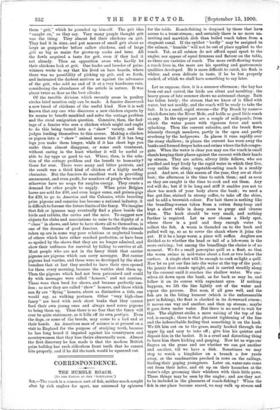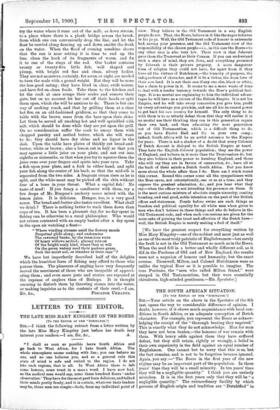CORRESPONDENCE.
THE HUMBLE ROACH.
[TO Tile EDITOR OF TUE "SPECTATOR."] Sin,—The roach is a common sort of fish, neither much sought after by- rich anglers for sport, nor esteemed by epicures for the table. Roach-fishing is despised by those that have access to a trout-stream ; and certainly there is no more un- inviting and mawkish dish than boiled roach taken from a stagnant canal. If the epithet " lordly " may be assigned to the salmon, " humble " will not be out of place applied to the roach. Yet, as all salmon do not afford equal sport to the angler, nor appear of equal firmness and flavour on the table, so there are varieties of roach. The more swift-flowing water a roach lives in, the more are his sporting and gastronomic qualities developed. He is more difficult to catch, his flesh is whiter, and even delicate in taste, if he be but properly cooked, of which we shall have something to say later.
Let us suppose, then, it is a summer afternoon; the hay has been cut and carted, the birds are silent and moulting ; the heavy green of late summer shows no autumnal change. Rain has fallen lately ; the stream that we know of is filled with water, but not muddy, and the roach will be ready to take the bait. It is a small, rapid stream—the Pip Brook by name--• which flows into the River Mole, and holds as good little roach as, any. In the upper part are a couple of mill-ponds, from which the water pours with vigorous force and much splashing. Then the current subsides, and the brook flows leisurely through meadows, partly in the open and partly overhung by the hedgerows. In places it runs rapidly over the stony shallows ; in places the current has worn away the banks and formed deeper holes and swims where the fish congre- gate. When the water is clear you may see the roach in small shoals keeping their places against the current with their heads up stream. They are active, silvery little fellows, who are purified and kept lively by the rapid water in which they live, very unlike the slimy, vegetable-eating roach in a muddy pond. And now, at this season of the year, they are at their best ; the afternoon is the time to catch them; and as soon as they are caught is the time to cook and eat them, Any rod will do; but if it be long and stiff it enables you not to show too much of your body above the bank; we need a fine gut-line, stained in strong coffee, to take off the shine, and to add a brownish colour. For bait there is nothing like the brandling-worms taken from a rotten dung-heap and kept a short while in damp moss to purge and cleanse them. The hook should be very small, and nothing further is required. Let us now choose a likely spot, where there is a pool and deep enough water to collect the fish. A worm is threaded on to the hook and pulled well up, so as to cover the shank where it joins the gut. If it be a large worm a piece will suffice. Anglers are divided as to whether the bead or tail of a lob-worm is the more enticing; but among the brandlings the choice is of no moment. We fix a small porcupine quill as a float, so that the worm swims in mid-water about a foot or two below the surface. A single shot will be enough to cock so light a quill. Now let us put our line into the water at the top of the pool; the jaunty float stands upright, and is carried steadily along by the current until it reaches the shallow water. We our- selves sit down upon the bank, as far back as may be, and follow it on its course with expectant eyes. If nothing happens, we lift the line lightly out of the water and repeat the. process. But soon, if all goes well, and the fish are in the biting humour (which is the unforeseeable part in fishing), the float is checked in its downward course ; it moves one way and another, and then up stream ; maybe it goes down under water. But there is no need to wait for this. The slightest strike, a mere raising of the top of the rod, is enough ; there is that pleasant tightening of the line and the indescribable feeling that something is on the hook. We lift him out on to the grass, neatly hooked through the upper lip and easy to take off ; give him his quietus and deposit him in the basket. It is a cruel and disturbing thing to have him there kicking and gasping. Now let us wipe our fingers on the grass and see whether we can get another and another, till we have a dish. Sometimes we may stop to watch a kingfisher on a branch a few yards away, or the sandmartins perched in rows on the railings, feeding their gaping youngsters. Later on, water-rats come out from their holes, and sit up on their haunches at the water's edge groom,ing their whiskers with their little paws. These things may be seen by the angler; and are they not to be included in the pleasures of roach-fishing ? When the fish in one place become scared, we may walk up stream and
try the water where it runs out of the mill ; or down stream, to a place where there is a plank bridge across the brook, from which one can conveniently drop the line, and let the float be carried along dancing up and down amidst the froth on the water. When the flood of evening sunshine shows that the sun is near setting it is time to reel up the line, clean the hook of its fragments of worm, and fix it to one of the rings of the rod. Our basket contains twenty or twenty-five little fish, well shaped and plump, with bright red fins and clean, silvery bodies. They are not monsters, certainly, for seven or eight are needed to turn the scale with a pound weight. But they will be none the less good eating; they have lived in clear, swift waters, and have fed on clean foods. Take them to the kitchen and let the cook at once scrape their scales and remove their guts, but on no account let her cut off their heads or split them open, which she will be anxious to do. There is but one way of cooking roach, and that by grilling them at a clear hot fire, on an old-fashioned gridiron, so that they come to table with the brown sears from the bars upon their skins. Let them be served all smoking hot and well sprinkled with salt, which should be done while they are yet upon the grill. On no consideration suffer the cook to smear them with chopped parsley and melted butter, which she will want to do; they should have dry skins and no liquor in the dish. Upon the table have plates of thickly cut bread-and- butter, white or brown ; also a lemon cut in half, so that you may squeeze a little juice on your plate, and not cut into eighths or sixteenths, so that when you try to squeeze them the juice runs over your fingers and spirts into your eyes. Take
a fish upon your plate, and a fork in either hand, and split your fish along the centre of his back, so that the mid-rib is separated from the two sides. A fragrant steam rises as he is split, and the white meat may be picked off the skin without fear of a bone in your throat. What a capital fish ! No
taste of mud! If you fancy a condiment with them, try a few drops of Mr. Burgess's anchovy sauce mixed with the lemon juice. it is delicious. Hunger, too, is a very good sauce. The bread-and-butter also tastes excellent. What shall we drink ? There is nothing better to wash them down than cups of tea. It has been a pleasant day, for no day spent in fishing can be otherwise to a rural philosopher. Who would not return contented with an empty basket after a day spent in the open air watching a float-
" Where winding streams amid the flowery meads Perpetual glide along; and undermine
The caverned banks, by the tenacious roots Of hoary willows arched ; gloomy retreat Of the bright scaly kind, where they at will On the green watery reed their pasture graze, Suck the moist soil, or slumber at their ease " ?
We have but imperfectly described half of the delights which the humblest form of fishing may afford to those who pursue them. The pleasures of angling have very frequently moved the merriment of those who are incapable of appreci- ating them; and even more jests and stories are repeated at the expense of anglers than of Bishops. It is thought amusing to disturb them by throwing stones into the water, or making inquiries as to the contents of their creeL—I am,







































 Previous page
Previous page